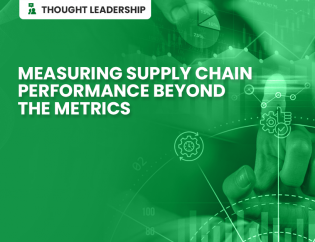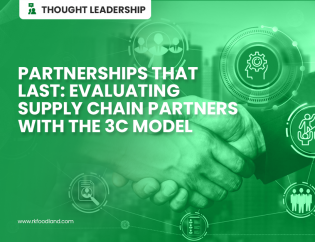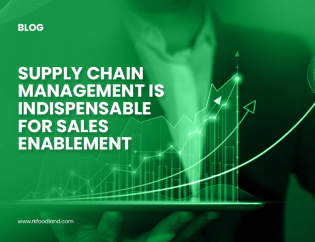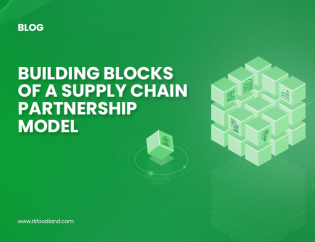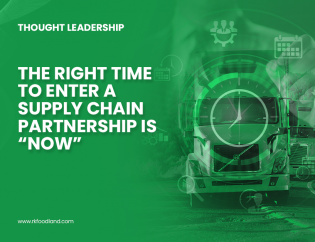
[Avg. Read Time = 4 mins]
In the dynamic world of Food Service and FMCG, managing Supply Chain is akin to conducting a complex orchestra. Each player, or in this case, everyone involved in the Supply Chain, plays a critical role. However, reliance on key individuals, often termed as ‘Key Man Risk’, can pose significant challenges to the sustainability and resilience of these operations. At RK Foodland, we understand the nuances of this risk and the importance of mitigating it through robust strategies and an account-based approach.
Significance of Key Man Risk Management in Food Supply Chain
The term ‘Key Man Risk’ refers to the high dependency on certain individuals whose expertise and relationships are crucial in food Supply Chain. These individuals often hold the reins for critical functions such as procurement, logistics, and customer relations. Their sudden absence can lead to dire consequences, including delays in shipments, compromised quality control, loss of regulatory compliance, and a disruption in market knowledge and company vision. A study underscores the importance of mitigating key man risk in Supply Chains, noting that companies with effective risk management strategies can reduce losses by up to 70%.
Imagine a scenario where a seasoned procurement manager, who has nurtured relationships with key suppliers over years, suddenly departs. The immediate impact is substantial – procurement processes stall, supplier negotiations falter, and the finely tuned balance of supply and demand begins to waver. This is just the tip of the iceberg. Beyond the immediate operational disruptions, the departure of such a key individual can trigger a ripple effect throughout the entire Supply Chain. Long-term strategic initiatives may lose direction, critical market insights garnered over years could vanish, and the organization’s ability to adapt to market changes may be severely compromised.
Similarly, the impact when a logistics expert with a deep understanding of regulatory compliances and quality control standards leaves. The void left can lead to potential risks in food integrity, regulatory fines, or even a tarnished brand reputation due to compromised product quality. To ensure operational sustainability and resilience, it is essential to identify key roles within the organization and devise robust contingency plans, which include extensive cross-training and knowledge sharing.
The Power of Partnerships and Advanced Strategies
To mitigate the impact of Key Man Risk, leading food businesses embrace long-term strategic partnerships within their Supply Chains. These alliances go beyond mere transactional interactions, embedding deeper collaboration and shared goals. Food businesses and their supply chain partners adopt an account-based approach. This strategy reduces dependency on single individuals by distributing knowledge and responsibilities across a wider team. At RK Foodland, our focus extends to fostering account-based engagements with our clients. Our account-based approach not only mitigates the risks but also enhances the overall quality of service delivery, ensuring that our clients are always equipped to handle the dynamic demands of the food service and FMCG sectors.
- Diversify Team Expertise: Building a team with diverse skills reduces reliance on single individuals. Training programs and technology for knowledge documentation are essential. Companies with diverse and well-trained teams are 33% more likely to outperform their peers in profitability.
- Embrace Partnerships: Partnerships in food Supply Chain are crucial for reducing Key Man Risk. They ensure Supply Chain resilience by sharing responsibilities. Companies with strong Supply Chain partnerships experience 20% fewer Supply Chain disruptions, Gartner stated in its report.
- Account-Based Engagement Model: This model focuses on deep, strategic relationships with key accounts, sharing knowledge and responsibilities, thus reducing individual dependency.
Looking Ahead with Expertise and Best Practices
Our commitment to partnerships is central to our strategy, enhancing engagement processes for risk mitigation and Supply Chain resilience.
This involves:
- Continuous Process Improvement: Incorporating regular reviews and best practices, for staying ahead in the industry.
- Leadership in Food Supply Chain: Emphasizing transparency and mutual support fosters risk-averse and mutually beneficial partnerships increasing consumer trust by up to 94%.
- Future Preparedness: Robust Key Man Risk Management, coupled with strong partnerships, prepares us for industry challenges and sustainability.
In conclusion, managing Key Man Risk in food Supply Chain is vital for operational sustainability and growth. Adopting an account-based approach, fostering strong partnerships, and continuously improving processes are key strategies. At RK Foodland, we are dedicated to these strategies, ensuring resilience and success in the dynamic food Supply Chain landscape.
Unlock the resilience of your food Supply Chain, don’t let ‘Key Man Risk’ leave you vulnerable!
Related Content | Foodland’s Resources
- Minimising the risk of staff affecting your business valuation
- Four Ways to Manage Key Person Risk
- Is ‘Key Person Risk’ a problem in your business?
- Key Person Risk: Could the loss of one person sink your business?

